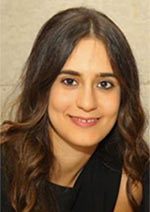Member Highlight: Dr. Roula Nassif

Member Highlight: Dr. Roula Nassif
Maitre de conférences (Assistant Professor)
Université Côte d’Azur, I3S Laboratory, France
 Dr. Roula Nassif received the Dipl.-Ing. and M.S. degrees in electrical engineering and industrial control in 2013 from Lebanese University, Beirut, and Compiègne University of Technology, France, respectively, and the Ph.D. degree in electrical and computer engineering in 2016 from the University of Côte d’Azur, Nice, France. She is currently a Maître de Conférence at the University of Côte d’Azur, Nice, France. From 2019 to 2021, she was an Assistant Professor at the American University of Beirut (AUB), Lebanon. Prior to joining AUB, she was a Postdoctoral Scholar with the Adaptive Systems Laboratory, École Polytechnique Fédérale de Lausanne, Switzerland. Her research interests include learning and adaptation over networks, decentralized processing under communication constraints, and graph signal processing.
Dr. Roula Nassif received the Dipl.-Ing. and M.S. degrees in electrical engineering and industrial control in 2013 from Lebanese University, Beirut, and Compiègne University of Technology, France, respectively, and the Ph.D. degree in electrical and computer engineering in 2016 from the University of Côte d’Azur, Nice, France. She is currently a Maître de Conférence at the University of Côte d’Azur, Nice, France. From 2019 to 2021, she was an Assistant Professor at the American University of Beirut (AUB), Lebanon. Prior to joining AUB, she was a Postdoctoral Scholar with the Adaptive Systems Laboratory, École Polytechnique Fédérale de Lausanne, Switzerland. Her research interests include learning and adaptation over networks, decentralized processing under communication constraints, and graph signal processing.
Dr. Nassif has been a member of the IEEE Signal Processing Society's Technical Committee on Signal Processing for Communications and Networking (SPCOM) since January 2023 and the EURASIP Technical Committee on Theoretical and Methodological Trends in Signal Processing (TMTSP) since January 2024. Additionally, since January 2024, she has served as a handling editor for the EURASIP Signal Processing Journal. She is currently a member of the direction committee of the I3S laboratory, where she conducts research at Université Côte d'Azur.
We approached Dr. Roula Nassif to learn more:
Q: What challenges have you had to face to get to where you are today?
The journey to where I am today has been both challenging and rewarding. At the age of 22, I left my country to pursue a PhD in France after completing my engineering degree. I then enriched my academic experience by undertaking a postdoc in Switzerland. Being away from my homeland for seven years was emotionally difficult, but it was a necessary step towards achieving my academic and personal goals.
After securing a tenure-track professorship position at AUB in my homeland, Lebanon, the country faced significant challenges, including political and economic instability in 2019 and the devastating Beirut port explosion in 2020. These factors disrupted my daily life and made it difficult to continue advancing my research in the way I had hoped. It was difficult to accept that the place I had envisioned for my career couldn’t support my aspirations because of circumstances beyond my control and that of the university itself. So I had to re-evaluate my situation and shift my direction to better align with my long-term goals. After careful consideration, my husband and I decided to seek a more stable environment that could support both our professional and personal aspirations, ultimately leading us to move to France.
As a mother of a young child pursuing an academic career, I feel it’s important to mention the challenges we face. In addition to the delicate task of balancing motherhood with a demanding academic career, the relentless pace of the academic world became particularly evident during my maternity leave. Unlike many other professions, academia doesn’t pause for personal life events-deadlines, ongoing projects, and student needs persist. The expectations of maintaining a certain level of involvement during maternity leave can be overwhelming. In a traditionally male-dominated field, there is often limited encouragement for the complete detachment required to fully focus on early motherhood. While universities and funding organizations have begun implementing more family-friendly policies, there is still significant room for improvement. Conferences, workshops, and academic events need to become more family-friendly by offering, for example, options for childcare, allowing women to bring their children with them and participate. Additionally, implementing official policies that grant longer extensions for things like tenure clocks or specific submission deadlines would provide support for mothers in academia.
Q: What was the most important factor in your success?
There are many important factors. If I were to highlight a few, I would mention the ongoing support I receive from my family, along with the strong theoretical foundation I gained at the Lebanese University, where we focused heavily on the fundamentals of engineering, and the inspiring environment in which my PhD took place. My PhD advisor, Professor Cédric Richard, played a crucial role in motivating me for research and introducing me to Professor Ali Sayed, a world-renowned expert in the field of signal processing. Working with Professor Sayed during my PhD and postdoc significantly shaped my research career. I feel privileged to have worked with such remarkable and influential mentors.
However, if I had to identify a single personal factor that stands out, it would be perseverance. As researchers, we often face moments of doubt and uncertainty. It’s essential to keep moving forward. Perseverance is what enables us to overcome setbacks and adapt to new obstacles. Achieving meaningful results or reaching our project objectives often requires years of work. It is through these incremental steps that, after three or four years, we can look back and see that we’ve accomplished something. During this time, it’s important not to give up, but to keep searching and pushing forward, even when the progress feels slow or uncertain.
Q: How does your work affect society?
Rather than focusing on how my research advances science and technology, I prefer to highlight the impact my work has on students. Students are the key component of academia, and this aspect is unique to academia, unlike in industry. As a professor in academia, I believe our influence on students shapes their vision for the future. We play an important role in motivating them and helping them understand the practical and theoretical aspects of what they are learning. Our research complements this role: the more we engage in research, the better equipped we are to help students and motivate them to innovate. By staying active in research, we remain up to date with the latest scientific innovations, and we can create an environment that fosters curiosity and critical thinking, ultimately preparing students to make meaningful contributions to society.
Q: What is the key take-home message would you like the readers to remember from this interview?
The key message to remember is that perseverance is essential to success. In academia, as in any field, we face challenges and doubt, but staying determined and continuously investing time and energy into our work can lead to meaningful outcomes. It's also important to seek support from those around us and remain open to change. As AI and other technologies are rapidly evolving in the industrial domain, it’s important to recognize the significance of our work in shaping the future of our students. Many of them will eventually transition into the industry, and the foundation we provide today will have a lasting impact on their contributions to the field.
Finally, maintaining a balance between research and teaching is important, as both are essential for a healthy academic career. The more time and effort we devote to our work, the better results we can achieve. However, it's equally important to find a balance between our academic career and family life. Balancing between the two is the key to achieve personal fulfillment and professional success.
Q: Failures are an inevitable part of everyone's career journey. What is the most important lesson you have learned from dealing with failures during your career?
In an academic career, we often face situations where we fail to achieve our goals. Examples include having our job application rejected, papers turned down, project proposals declined, or receiving criticism in our course evaluations. Sometimes, we may even find that someone else has reached better conclusions or achieved better results than we have. Personally, I've been knocked down countless times, but each time, I’ve made the decision to stand up. The key lesson from failure is how we learn from it and how we respond. Failure teaches us to adapt, rethink our approach, and be patient. It’s not the setbacks that define our work, but the way we move forward. Failures show that we are trying, and not giving up. If we don’t ask for funding, we certainly won’t get it. By applying for awards, despite knowing the high likelihood of rejection, we learn how to improve and refine our goals. Similarly, criticism in student feedback can provide us with valuable insights, allowing us to reassess our syllabus and improve our teaching. Each failure presents an opportunity to grow and improve.
Q: Failures are an inevitable part of everyone's career journey. What is the most important lesson you have learned from dealing with failures during your career?
My advice is simple: don’t give up. Build solid foundations for your ideas and identify practical applications. Whenever needed, seek feedback and take criticism constructively to refine your work. Try to connect the dots by diving deep into the literature and finding related work. This will allow you to position your approach within the broader context of existing knowledge. Innovation can face resistance, but persistence, refining your approach, and seeking diverse feedback will help you gain the credibility and support needed to move forward.

